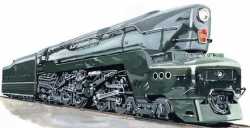>>1895104Passenger railway is profitable only in exceptional situations like Japan (high density, car usage not always most practical, money made with shops at stations, etc.), usually it needs to be publicly supported.
The US has probably the worst imaginable conditions for passenger rail to develop.
>no tradition of public servicesthe public don't care much for publicly provided services, and those that exist are often third-world-tier. Amtrak is basically just a heritage operation of cruise ships on land, with a few practical regional services sprinkled in between.
>car is practical, train is notsince public transit infrastructure was largely dismantled since the 50s/60s, and even train stations often moved outside of the urban centers, you don't even get the practicality of avoiding the car, maybe taking a short, easy trip to the station like in Europe or Asia (where public transport is often very centered on railway stations), instead you have to drive there or take a cab, like an airport. You might as well drive then for regional trips, or take the plane for longer journeys. Which leads me to
>extensive airline network, no tradition of regional railFew countries have such extensive air services as the US, even on a regional level, so usually flying is your best choice for longer journeys. On a regional level, where trains could be competitive against car (apart from the problem of lack of practicality), there's little tradition of such regional rail service, private passenger trains used to be mainly long distance type services with low frequencies, not european-type frequent regional lines covering maybe a few hundred miles between cities of the same region. Notice how boomers always go "hurrrr trains don't work bc USA so big!", they don't even consider the idea of regional services.
tl;dr the US will never again have good passenger rail, there's too many factors against it, mainly having over 70 years designed the whole country around *not* using trains

